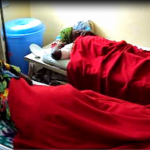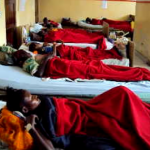The consequences faced by women with VVF are unimaginable. Physically, women experience uncontrollable leakage of urine, which can lead to infection and even paralysis. In cases of VVF caused by labor, the baby is often lost, so the woman must also deal with the emotional consequence of losing a child. Further emotional stress is caused by the social stigma these women face, as they are social outcasts because of their injuries and their increased risk of caring sexually transmitted diseases. Often times, they are rejected by their husbands and are left alone. According to our partner HEAL Africa, “they are left without social, emotional or economic support, no livelihood to sustain them, and no access to skilled medical care to treat their condition.”
Because of these tragic consequences, HEAL has developed a great plan for addressing the issue of VVF in the Congo:
- Prevent the incidence of obstetric and traumatic fistula.
- Identify women who are currently suffering from fistula.
- Repair women’s fistulae and support their emotional and spiritual healing.
- Reintegrate women into their communities after their fistulae have been repaired.
Through our partnership, HEAL Africa has been able to develop their Safe Motherhood Program. By placing women in small support groups, the Safe Motherhood Program grants at-risk women access to maternal healthcare by offering pregnancy, delivery, and neo-natal care; the program also provides mothers with information and training. Within the small groups, mothers support one another through micro-insurance groups that ensure each can pay for the costs of skilled care and by helping care for each other’s families during the absence of birthing mothers.
Here is the update we received HEAL:
“HEAL Africa received financing from Covenant World Relief to provide medical care for 12 fistula patients and to create 36 solidarity groups for women of child‐bearing age (Safe Motherhood). This program works to ensure that women don’t develop obstetric fistula simply because they could not access prenatal care and good delivery services. This project is coordinated by Nurse Rita Bobina, the head of the Vesico‐Vaginal Fistula department. Four women have already had surgery and benefitted from the CWR grant. In terms of the solidarity groups, these will be started in the community in the next few weeks.”
Included in their update were a couple of photos of women who received the life-changing surgery.
Praise God, the Great Healer! For more information on the project, click here.





One Response to “Congo Fistula Care”